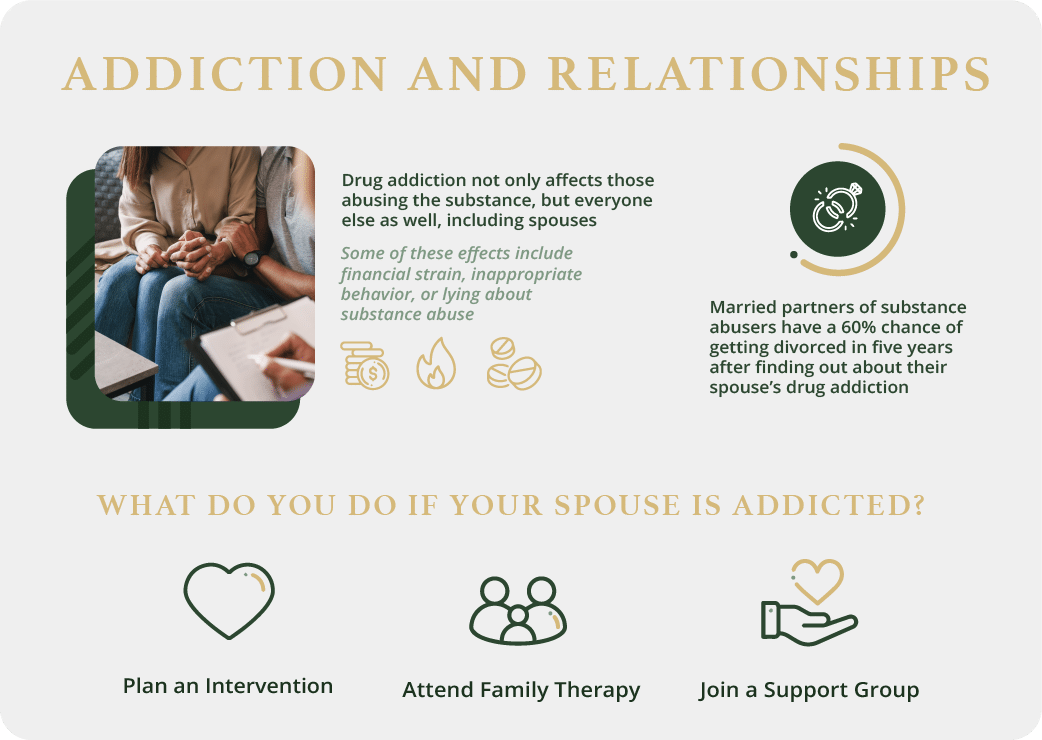Spouse of An Addict: A Guide To Healing and Recovery
Close relationships in our lives serve the purpose of fostering personal growth and establishing deep emotional connections. However, this essential concept can be overlooked when you are married to an addict. Being in a relationship with an addicted spouse can pose significant challenges. Witnessing their struggles can have a profound impact on both your mental well-being and the overall dynamic of the relationship.
Substance abuse can cause your relationship to deteriorate, leading to frequent conflicts and disagreements. If your spouse is battling drug abuse, you and others may experience its adverse effects as well. All types of addiction have the potential to create ripple effects in both your life and theirs. While it is undoubtedly a challenging situation, there are actions you can take to support your partner and yourself. Seeking emotional support and self-care is crucial during the recovery process.
At Eagle Creek Recovery in Nampa, Idaho, our team utilizes effective strategies for navigating addiction recovery with a partner. We believe that caretakers don’t receive the care or credit they need, which leads to burnout and other health issues. Therefore, we offer a variety of addiction resources to help the spouse of an addict.

Being the spouse of someone struggling with addiction can be an immensely stressful and complex experience. Although it may present challenges, it is crucial to maintain honesty with both yourself and your spouse throughout this journey. When facing difficulties in a relationship or marriage, seeking professional assistance is often the most effective course of action. If you find yourself in this situation, consider reaching out to our reputable drug rehab facility.
Our comprehensive addiction treatment services are designed to provide the best possible care for you or your spouse. Additionally, our family therapy sessions can help you address and navigate any relationship issues that may arise.
In the realm of long-term relationships, many individuals anticipate a fulfilling experience that promotes personal growth. Romantic partnerships demand unwavering commitment, support, and love for one’s significant other, regardless of the circumstances. Unfortunately, addiction can profoundly impact a relationship, often serving as a harsh awakening for the spouse of an addict.
How Does Addiction Affect Relationships?
Addiction poses a significant obstacle in people’s lives and can destroy relationships. Drug addiction can quickly lead to stress and complications, particularly for the spouse. Families and every dynamic within one is affected by a spouse’s substance abuse. Unfortunately, it’s a very common occurrence for the partner or caretaker. experiences mental distress and other issues due to drinking or drug use and in some cases domestic violence as a result.
Intimate relationships often experience numerous ups and downs. Being in a close relationship with a person battling addiction can result in a tumultuous ride of emotional strain, disorder, and aggression. Addiction-driven behaviors can involve inflicting mental and physical abuse on loved ones, which shatters trust, an indispensable element of any healthy relationship.
Moreover, addiction can give rise to financial difficulties. In cases where children are involved, addiction can trigger disputes over parental responsibilities, lead to neglect, and even jeopardize their safety. A substance abuse problem ravages every aspect of an individual’s life, particularly their romantic and sexual relationships.
The insidious nature of drug abuse subtly infiltrates an addict’s life through seemingly harmless actions like using alcohol to cope with daily challenges or getting high in social gatherings with friends. Over time, such behavior transforms into an all-consuming addiction. Here are some common problems that may arise in relationships with addicts:
- Financial difficulties
- Verbal, physical, or sexual abuse
- Frequent conflicts
- Anger and resentment
- Legal problems (Child custody disputes or legal consequences related to drug use)
- Depression, loneliness, and other mental health challenges
- The spouse may turn to drugs or alcohol as a way to cope
Furthermore, drug and alcohol abuse can create a home environment filled with resentment, anger, and impaired decision-making. In severe cases, it can even lead to physical, mental, or sexual abuse. It is crucial to recognize when emergency assistance is necessary, such as in situations involving legal charges or immediate danger. If you have an addicted spouse and feel unsafe, seek immediate help from your local authorities.
How Drug and Alcohol Abuse Can Impact Spouses
Anyone who has a family member with a substance abuse issue would know how difficult it is to live with it. Regardless of the nature of the person, there are significant changes that happen in someone with an addiction that ultimately affects everyone around them. This is particularly true for the parents, siblings, children, and spouse of an addict.
The most common issue that arises in a family that has someone with a substance use disorder (SUD) is the potential for violence. The most common instances are when the person with the addiction is not able to secure their “supply” of whatever substance they are addicted to. In these instances, the person could feel highly agitated and will instantly react violently to anyone who tries to interact with them. This belligerence has often resulted in one or more family members requiring medical attention for injuries and the person with addiction being in the custody of the police.
The violence in a family with an addict in it could also be directed the other way, as the person who has the habit could be the victim of domestic abuse. Many people who silently suffer physical and verbal abuse at home MIGHT do anything to escape from the cruelty, including abusing drugs and alcohol.
Trust is one of the most important things that tie a family together. This is particularly true for spouses. If there is anyone in the world that a person would invest trust in, they would always choose members of the family first before anyone else. It is, however, quite difficult to trust someone who appears to have different interests at heart. There are many people with substance abuse issues who resort to lying and stealing from spouses or other family members just to support their habit, as a drug habit could be quite expensive.
This loss of trust could also stem from the person with the substance abuse issue. Many people who have an addiction are also prone to severe paranoia. In others, it could be some leftover sense of guilt over the realization of what their habit is doing, which ironically will only cause them deeper into their addiction, as they believe no one else will invest any trust in them anyway.
Disagreements are perfectly normal in any kind of relationship, as each person is a unique individual and will not necessarily always agree with what others say, even if the other person is a spouse or sibling. In cases of substance abuse, however, the arguments are fueled by something far more serious than just a simple disagreement. Apart from the fact that people with substance abuse are quite difficult to have a decent conversation with, the emotional investment involved in an argument with a spouse is magnified when part of the problem is addiction.
The issue of addiction has even been used as grounds for divorce in many instances, although many counselors advise couples to seek family therapy together or at the very least support the partner that has an addiction to aid in their recovery. Many couples, however, typically choose to separate instead, particularly if there are children involved, to spare the children from the difficulty of living a life with a parent who suffers from an addiction.
While many couples do fulfill their vows of “in sickness and in health”, some take it even further. A sad reality of having a spouse who has an addiction is that the other partner also risks developing the habit themselves, particularly if they indulge the other partner instead of confronting them. This is not an uncommon thing, as there are so many people who develop an addiction mainly because they are having a relationship with someone who already has it.
Some of these instances begin in the form of support, as the sober partner tries to convince the other partner how bad addiction is by getting into it as well. In most cases, this backfires because the formerly sober partner also develops a taste for the substance, and they both end up being fully immersed in addiction. This is one instance where the wedding vows should not be followed as it would only result in more trouble.
Many spouses tend to accept their partners regardless of the troubles they come with, including substance abuse. It is not uncommon for husbands or wives to simply carry on as if nothing is wrong with their spouse, in the hopes that someday they will get their act together and get help for their destructive habit. The problem here, however, is that with only one member of the couple doing all the work, it could further strain the relationship in a way that is completely avoidable.
Many faithful spouses suffer in this manner, as they struggle to keep the family together while eking out a living for the family. This could become an even bigger problem once the person with addiction begins to succumb to the damage done by their bad habit. The damage could require hospitalization, an addiction treatment program, and exorbitantly priced medications. This is particularly true if the person with the addiction requires an organ transplant to replace the one already damaged by their bad habit.
Turning to other people for succor is a very human response, although, in the case of people who have a spouse who is an addict, the situation is often compounded because the succor given by another person could very well influence acts of infidelity. The sober partner could find the care and attention they desperately crave from others, and this could lead to a situation where they have relations with the person they find the care and attention from.
This situation could be a bigger disaster because it is not uncommon for many relationships to quickly turn dangerous and even fatal in cases like this. A person with an addiction is also quite likely to be mentally unstable and could react explosively once they learn that their spouse is already in the arms of another person. There are many horrific instances where the spouse who is an addict turns their anger towards whoever they find with them in the house, which is often their children.
The process of separation is hardly a smooth transition. There will always be the issue of unspoken anger, doubts over finances, and other matters that are suddenly brought out when one member of the couple files for divorce. Having a spouse who has an addiction issue provides the other partner with additional ammunition to use in the legal battle that typically follows a messy divorce.
For someone who is already hard on finances, having the additional financial concerns of obligations that turn out during the divorce proceedings could be devastating. This problem could further drive the person with addiction into despondency until they do something they will regret.
Helping Vs Enabling
To support your spouse’s addiction treatment effectively, it is crucial to offer unwavering support throughout the entire process. As the spouse of an addict, trying to maintain a good mindset and focus on the ultimate goal of sobriety is paramount.
Although the journey may be arduous and draining, achieving a life free from addiction can unlock happiness and significantly improve both your life and your loved ones. Preventing unintentional enablement of your partner’s substance abuse is of utmost importance. There’s a difference between helping vs enabling. Enabling occurs when you allow your partner to continue using substances without facing any consequences.
Unfortunately, enabling behaviors can arise even when one’s intentions are good. Here are some examples of enabling:
- Assuming the responsibilities of a loved one who is using drugs.
- Sacrificing your own needs and desires to assist someone else.
- Making excuses for or taking the blame on behalf of your loved one’s drug use.
- Permitting physical, emotional, or sexual abuse to occur, whether to yourself or another family member.
- Lending money or allowing the use of finances for drugs or alcohol.
- Ignoring or avoiding the problem altogether.
Establishing healthy boundaries and maintaining honesty with your partner are essential steps to avoid enabling their drug use.
Co-Occurring Disorders: Mental Health and Substance Abuse
If you are in a relationship with someone who is addicted, you have witnessed the devastation that the disease can cause. Addiction affects more than just your spouse; it also affects you. The spouse of an addict is frequently held accountable for the consequences of their partner’s actions.
When you are married to an addict, your spouse can struggle not only with drug or alcohol abuse but also with mental illness. This is referred to as a dual diagnosis by professionals. An estimated 20% of Americans who suffer from depression or anxiety also have substance use disorders.
Oftentimes, mental health issues and substance use disorders coexist. Certain forms of illicit drugs, for example, can lead persons who are addicted to have one or more signs of a mental health disorder.
Changes in brain makeup, genetic vulnerabilities, or early life stress or trauma are all common underlying causes of both mental and drug use issues. More than one in every four people who have a serious mental illness also have a drug addiction. Substance use disorders are more prone to develop in tandem with specific mental health conditions, such as:
As some people who suffer from mental health illnesses use drugs as a way to self-medicate or cope, pre-existing mental health problems can occasionally lead to alcohol or drug abuse, and vice versa. This will be a vicious cycle until the addictive behaviors are managed with professional help.
Contact Eagle Creek Ranch
Recovery Today!
Why Wait? Find The Help You Need By Reaching Out To Us Today! Our Admissions Team Is Standing By.
HOW IMPORTANT IS SUPPORT FOR A SPOUSE WITH DRUG OR ALCOHOL ADDICTION?
Support for anyone going through a troubling phase in their lives could mean the difference between being able to overcome their challenges and choosing to simply give up on life. In the case of someone who is the spouse of an addict, the support needed here should be aimed at helping them get the addiction treatment they need, and not to further goad them deeper into addiction.
The most important form of support a person with an addiction could receive would typically come either from the parents or from the spouse, as this type of support is sincere, enduring, and is the type of support that will weather any kind of challenge. This is why only the closest members of the family are advised to participate in interventions because these are events where support needs to be accepted before it can do any real good.
The support that comes from people where love and compassion are real is also the kind that comes without conditions. This is important because there are so many situations today where favors or even support comes at a price. There is usually something that needs to be repaid once the support is given, and this is not something to be expected from the support that comes from a spouse. Just as a loved one would do anything to help someone dear to them, so is the support of the spouse expected to be.
In practically every case of someone with a substance abuse issue, the person with the addiction will always doubt if he or she is worth the effort to save from the addiction. This belief is crucial because it could be the point where they decide to truly try to get better or decide that they are better off as they are and will see the end of their days abusing substances. The support of a spouse can validate the person enough to believe that they are worth saving, and this would help them build a sense of self-worth needed to accept and push through with rehabilitation.
WHAT ARE THE DO’S AND DON'TS IN TRYING TO HELP A SPOUSE WITH ADDICTION?
A person with substance use disorder is typically in a very vulnerable position when it comes to emotions. This means that there is a need to tiptoe through some things if the person is expected to want to recover.
DO’S FOR THE SPOUSE OF AN ADDICT
- Offer to listen to them when they want to talk. The spouse does not need to offer any kind of solace or comfort if it is not asked for, since most of the time, people who suffer from addiction just want to be heard so that others can understand them.
- Offer comfort if it is being asked for. The last thing a person with an addiction would want to feel is alienation from the very person he or she expects to receive support from. There is just a need to ensure that the support is not the kind that would only aid them in getting deeper into addiction.
- Pay attention to the person when it feels like they need it. Giving someone the time of day is perhaps the best way to show them that they have value, as it is so easy to ignore others when it is convenient to do so.
- Be attentive to the state of the person to see if the addiction is already going into a phase where emergency medical care might be needed. This is important because there are so many cases where people who succumbed to an overdose could have been saved if only someone cared enough to see they were already in need of medical attention.
- Plan the best way to get the person into an Idaho drug detox center and rehabilitation. Regardless of what they are saying, even if they insist that they are fine or their current state is the state they want to be in, addiction will almost always lead to death. The best way to avoid this is to carefully plan an intervention and get it underway as soon as everything has been properly plotted out.
DON’TS FOR THE SPOUSE OF AN ADDICT
- Don’t berate or criticize someone with a substance use disorder. This kind of “care” will never work because it will only serve to alienate the person and stress them unnecessarily. Criticism is not something that they would like to be given in any form, regardless of the intentions behind it.
- Don’t force them into something they do not want to be part of, such as checking themselves into outpatient rehab in Idaho. This might go against logic but so many people did not complete rehabilitation or slipped right back into relapse after residential treatment because they were never properly eased into it. It is important to remember that a person with addiction already feels like they have no control over their habits, and forcing them will only aggravate things. Plot out a proper intervention and move forward from there instead of forcing them outright.
- Don’t nag them. Many believe that if a person with addiction hears it enough times, they will suddenly think that it might be better to quit whatever they are taking and go clean. It doesn’t work this way. Nagging will only convince them that being drunk or high all the time is far better than hearing the constant droning of their spouse.
- Don’t box them in. Remember that many people already do not respond well to being boxed in as it not only removes their options but also makes them feel like other people are just trying to dictate how their life should go. Regardless of the good intentions in trying to prevent them from taking substances or from acquiring the substance from their supplier, boxing them in would be no better than sending them to jail. They will be imprisoned but not treated.
- Don’t blame them for whatever it is that is happening to them. There is a good chance that they are already blaming themselves for all the bad that is happening, and any kind of blame coming from a spouse or loved one could push them off the deep end.
Substance Abuse Treatment Offered at Eagle Creek
As difficult as being the spouse of an addict might be, there are things that individuals and their partners can do today to improve the situation. Being the spouse of an addict is a difficult road, but dealing with the problem is vital for a happier and healthier life. You may assist yourself and your spouse with an addiction by identifying the problem and working through numerous steps.
When married to an addict, it might feel like a never-ending cycle of emotional, physical, and financial distress. Luckily, there are additional resources for substance abuse available if your partner is willing to seek help to break the cycle. Some levels of care include:
- Support groups
- Individual therapy
- Group therapy
- Family therapy
Getting assistance for your spouse’s addiction is one of the most important things. Treatment for an addicted spouse entails not just the individual’s conduct, but also treating the relationship as a whole. According to research, involving partners in the therapy process at some stage is critical to its effectiveness. For people with an addicted spouse, support groups can be the best tool or resource to guide them during this difficult journey.
Fortunately, treatment programs such as inpatient or outpatient rehab in conjunction with family therapy and other types of counseling are available in addiction recovery to aid in healing. Addiction has a way of infiltrating even the most loving and supportive relationships. However, with expert care and counseling, families can achieve real healing and liberation.
Find Substance Abuse Treatment for Your Spouse Today

You may be wondering what to do if your spouse is abusing drugs or alcohol, but are ready to give up. However, with intervention and the right help, there’s still hope, and you’re not alone!
At Eagle Creek, our mission is to help individuals married to an addict heal and become a valuable source of support for individuals and their families. Our Idaho drug rehab center believes in working with compassion, care, and evidence-based approaches that help a person understand why they need to get better. We can help you or a loved one recover and achieve long-term sobriety. Talk to us now.

Clinical Director
Kendall Maloof is the clinical director at Eagle Creek Ranch Recovery. She is a licensed marriage and family therapist and has held multiple leadership roles before settling here at Eagle Creek. Kendall received her master’s degree in marriage and family therapy from the Chicago School of Professional Psychology in 2016. Her career in mental and behavioral health began in 2014 when she took up internships in both the nonprofit and for profit sectors. She interned at multiple reputable companies, such as The Living Success Center and 449 Recovery in California.
In 2019, Kendall became the clinical director of Sunsets Recovery for Woman, a dual diagnosis program in southern California. Kendall is a natural leader. She has an incredible ability to problem solve and stay calm in any situation. Kendall never fails to show up when she is needed, and her calm demeanor makes her team and clients feel at ease. Eagle Creek Ranch Recovery is proud to have Kendall as our clinical director.





